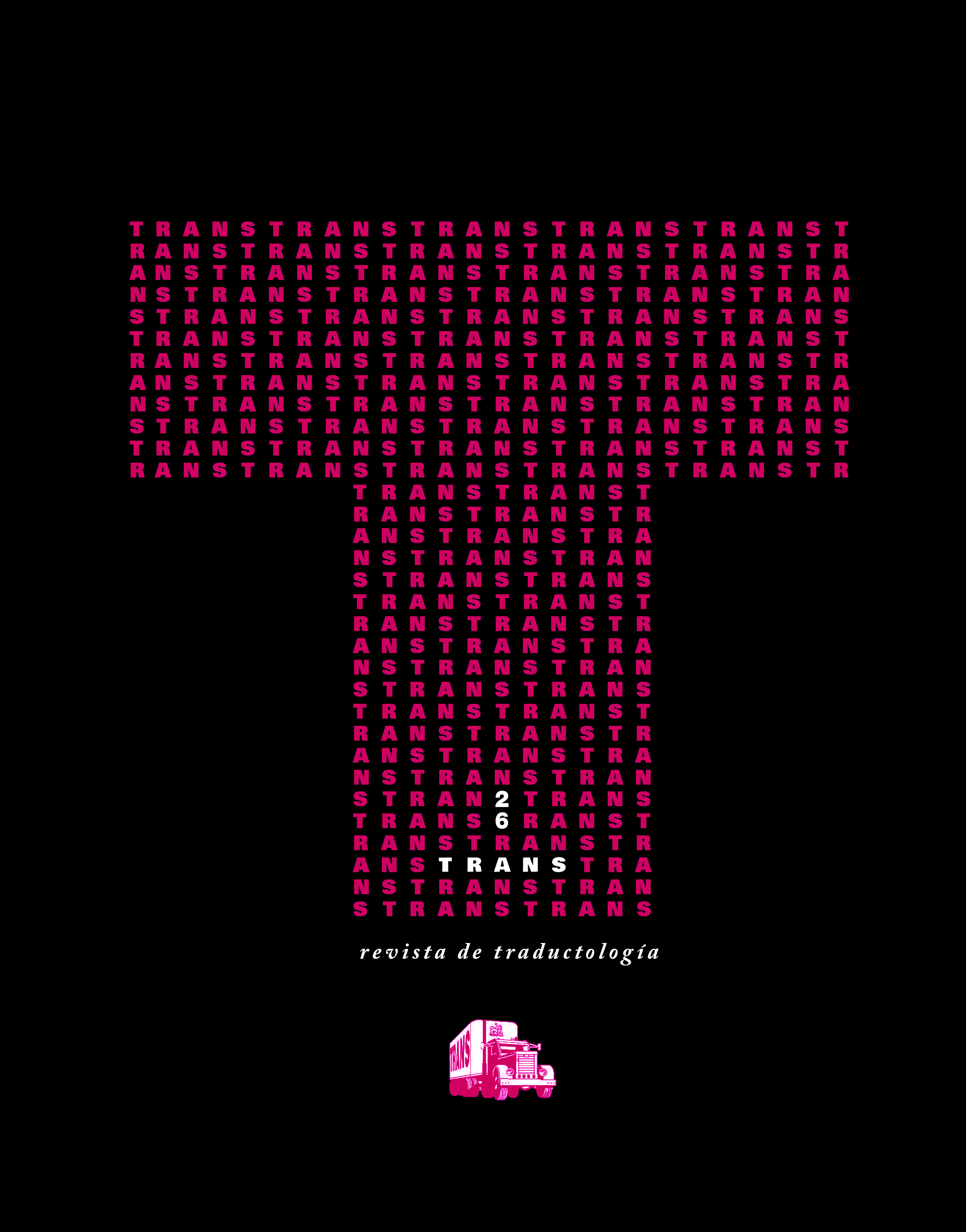Heterolingualism in multilingual versions of classic cinema: The case of <em>Der blaue Engel</em>
DOI:
https://doi.org/10.24310/TRANS.2022.v26i1.12557Keywords:
heterolingualism, history of dubbing, multilingual versions, audiovisual translationAbstract
The aim of this article is to study the audiovisual translation of the first sound film in German cinematography, Der blaue Engel (von Sternberg, 1930), in its English version, The Blue Angel, from a specific perspective in translation studies: heterolingualism. In this article, we are interested in observing Josef von Sternberg’s ability to adapt to the expansion of the modes of communication in the transition from silent films to talkies and also to fulfill the role of a translator of his own work. This is a privileged moment in film history, rich in creativity, in which we can see the great challenge of this project: to simultaneously shoot two versions of the same film, one in German and the other one in English, with the very same actors. In the process, and to be able to succeed in his creative vision for this film, Josef von Sternberg had to overcome the artistic, linguistic, and cultural problems inherent in the switching of languages and mode of communication.
Downloads
Metrics
Publication Facts
Reviewer profiles N/A
Author statements
Indexed in
-
—
- Academic society
- N/A
- Publisher
- Universidad de Málaga
References
Ávila, A. (1997a). El doblaje. Cátedra.
Ávila, A. (1997b). La historia del doblaje. CIMS Ediciones.
Brockmann S. (2010). A Critical History of German Film. Camden House.
Cerezo, B., de Higes, I., Galán, E., y Arnau, R. (2017). Montaje audiovisual e integración de la audiodescripción en la producción documental. inTRAlinea, 19 (Special Issue: Building Bridges between Film Studies and Translation Studies. J. J. Martínez Sierra y B. Cerezo Merchán (Eds.). http://www.intralinea.org/specials/articl /montaje_audiovisual_e_integracion_de_la_audiodescripcion.
Chaume, F. (2004). Cine y traducción. Cátedra.
Crosland, A. (Director). (1927). The Jazz Singer (Película). D. F. Zanuck.
Dupont, E. A. (Director). (1929). Atlantic (Película). E. A. Dupont.
Fortea, C y Gómez, C. (2020): El análisis literario como herramienta de traducción: tras los pasos de Pilar Elena. En M.ª A. Recio, S. Roiss y B. Santana (Eds.). Del texto a la traducción. Estudios en homenaje a Pilar Elena. (pp. 29-42). Comares.
Gottlieb, H. (1997): Subtitling against the Current: Danish Concepts, English Minds. En J. Díaz Cintas (Ed.). New Trends in Audiovisual Translation (pp. 21-43). Multilingual Matters.
Hurtado Albir, A. (2001). Traducción y traductología: Introducción a la traductología. Cátedra.
Izard, N. (1992). La tradució cinematográfica. Generalitat de Catalunya.
Ivarsson, J. (1992). Subtitling for the Media: A Handbook of an Art. Transedit.
Lang, F. (Director). (1927). Metropolis (Película). E. Pommer.
Mann, H. (1905). Professor Unrat oder das Ende eines Tyrannen. Langen.
Minutella, V. (2012). You Fancying Your Gora Coach Is Okay with Me: Translating Multilingual Films for an Italian Audience. en: A. Remael, P. Orero y M. Carroll (Eds.) Audiovisual translation and media accessibility at the crossroads (pp. 313-334). Rodopi.
Murnau, F. W. (Director). (1924). Der letzte Mann (Película). E. Pommer.
Reed, L. (Director). (1929). Rio Rita. (Película). RKO Radio Pictures.
Remael, A., Orero, P., y Carroll, M. (Eds.). (2012): Audiovisual translation and media accessibility at the crossroads. Rodopi.
Romero-Fresco, P. (2013): Accessible filmmaking: Joining the dots between audiovisual translation, accessibility and filmmaking. Journal of Specialised Translation, 20, 201-223. http://www.jostrans.org/issue20/art_romero.php.
Romero-Fresco, P. (2017). Accessible filmmaking in documentaries. inTRAlinea (Special Issue: Building Bridges between Film Studies and Translation Studies). http://www.intralinea.org/specials/article/accessible_filmmaking_in_documentaries.
Romero-Fresco, P. (2018). In support of a wide notion of media accessibility: Access to content and access to creation. Journal of Audiovisual Translation, 1(1), 187-204.
Romero-Fresco, P. (2019). Accessible filmmaking: Integrating translation and accessibility into the filmmaking process. Routledge.
Romero-Fresco, P. (2020). The accessible filmmaker and the global film. MonTI - Monografías de Traducción e Interpretación, 12, 381-417.
Romero-Fresco, P., y Freyer, L. (2018). Accessible Filmmaking Guide. Archer’s Mark.
Sternberg, J. von (Director). (1928). The Last Command. (Película). Paramount.
Sternberg, J. von. (Director). (1930). Der blaue Engel (Película]. [DVD, Divisa Home Video 2018].
Sternberg, J. von. (Director). (1930). The Blue Angel (Película). E. Pommer. [DVD Divisa Home Video 2018].
Sternberg, J. von (1965). Fun in a Chinese Laundry. Mercury House.
Venuti, L. (1995). The translator’s invisibility: A history of translation. Routledge.
Vermeulen, A. (2012): Heterolingualism in audiovisual translation: Dee Zaak Alzheimer/La Memoria del Asesino. En A. Remael, P. Orero y M. Carroll (Eds.). Audiovisual translation and media accessibility at the crossroads. (pp. 295-313). Rodopi.
Wiene, R. (Director). (1920). Das Cabinett des Dr. Caligari (Película). R. Meinert, E. Pommer.
Downloads
Published
How to Cite
Issue
Section
License
All contents published in TRANS. Revista de Traductología are protected under the Creative Commons Attribution-NonCommercial-ShareAlike 4.0 International (CC BY-NC-SA 4.0) license. All about this license is available in the following link: <http://creativecommons.org/licenses/by-nc-sa/4.0>
Users can copy, use, redistribute, share and exhibit publicly as long as:
- The original source and authorship of the material are cited (Journal, Publisher and URL of the work).
- It is not used for comercial purposes.
- The existence of the license and its especifications are mentioned.
- ShareAlike — If you remix, transform, or build upon the material, you must distribute your contributions under the same license as the original.
There are two sets of authors’ rights: moral and property rights. Moral rights are perpetual prerogatives, unrenounceable, not-transferable, unalienable, imprescriptible and inembargable. According to authors’ rights legislation, TRANS. Revista de Traductología recognizes and respects authors moral rights, as well as the ownership of property rights, which will be transferred to University of Malaga in open access.
The property rights are referred to the benefits that are gained by the use or the dissemination of works. TRANS. Revista de Traductología is published in an open access form and it is exclusively licenced by any means for doing or authorising distribution, dissemination, reproduction, , adaptation, translation or arrangement of works.
Authors are responsable for obtaining the necessary permission to use copyrighted images.













21.png)
